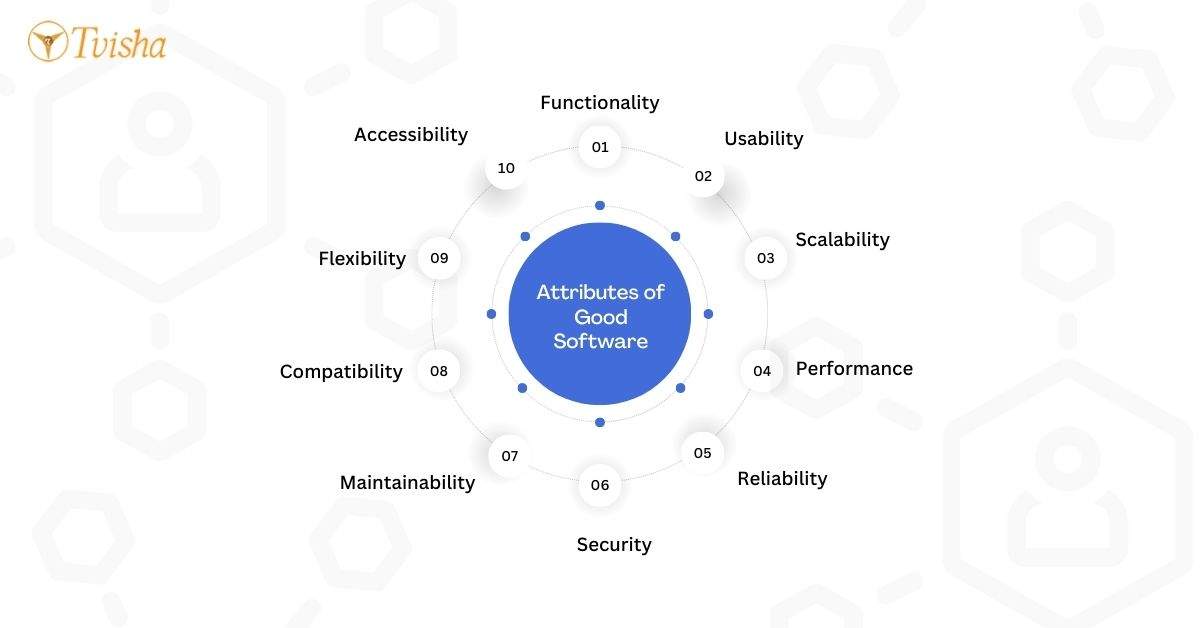
What Are the Attributes of Good Software ?
Nowadays, you can find different software, but finding good software is essential. Treating the software as good depends on many factors, like what it offers to a user and how you can utilize it. However, its characteristics decide that good software properties are divided into three groups - Operational, Transitional, and Maintenance.
It is known that software engineering is the procedure of developing, designing, and maintaining software systems. So good software is the one which meets all these users' needs, does all the required operations with reliability, and is easier to manage. You will also find other good software characteristics identified by software engineers. These are the things which are essential to take into account while developing a software system. So let's define the Attributes of Good Software.
Definition of Software Attributes
Good software attributes are the features which provide a software product's performance measurement by the professionals of software testing. Their role is essential in helping the software architects that a software app will work as per the prediction depending on the specifications offered by the client.
There are various software quality attributes, so what are attributes of good software? The characteristics include the following -
- Functionality
- Usability
- Scalability
- Performance
- Reliability
- Security
- Maintainability
- Compatibility
- Flexibility
- Accessibility.
Importance of Good Software Attributes
When you know What are the Attributes of Good Software, it is also necessary to see the significance of such characteristics.
A software engineer should consider what are attributes of good software while creating any type of software product because the correct attributes are important for making software suitable.
The Reasons for this are -
A good software product has to fulfil the needs of a business and end-user.
The development and maintenance of software need to be cost-effective.
Software development must be completed within a specific time.
You can find various software products in the market that offer several benefits to industries. So software developers put their keen interest into making great products that work well. However, they must remember other things that can make a software product excellent. So whether you are a software developer or interested in enhancing your development but don't know how to do it, you can then include these fundamental attributes of software into the core functionality of your software to make it good.
These characteristics make software a high-quality product by enhancing it. The importance of these attributes will differ based on the application. So make sure to create a software product that possesses these attributes and better qualities.
Essential Attributes of Good Software
Many customers use software to meet their specific needs. In the same way, software developers who design, code, and maintain the software assess its internal characteristics to determine the software quality. So let's discuss the crucial attributes of good software briefly.
1. Functionality
The software's functionality is defined as its ability to perform and function based on the design specification. Many software testing professionals claim this is a crucial attribute because they think an application fails mainly at the starting level if it doesn’t operate as predicted. So they always perform tests to validate the required functionality during the software testing in earlier stages.
Importance of Good Functionality
The significance of functionality is that it offers a software product the capability to operate the proposed work to obtain effectiveness at a high level than other products. It is to provide substantial value to the customers.
Examples of Good Fuctionality
- Accuracy
- Completeness
- Interoperability etc
Tips to Improve Functionality
- Understand the target users' needs and expectations from software. Then, it will help you design software which meets their requirements.
- Define software scope clearly to prevent adding extra features and concentrate on the primary functionality.
- Plan the development.
- Design with better modularity in mind.
- Test and debug any arising issues.
- Evaluate continuously and refine the software.
- Utilize users' feedback.
2. Usability
It refers to the ease with which a user can learn to utilize a software product to execute the tasks on the system. Also, using it to on necessary actions mainly which achieving the goals.
Importance of Good Usability
It is essential for the success of software products to design one’s that are efficient, intuitive, and user-friendly. This makes developers enhance user retention, productivity, and satisfaction while decreasing development costs and obtaining a competitive benefit.
Examples of Good Usability
- Interface design
- Navigation
- Consistency etc
Tips of Improve Usability
- Recognizing the user’s needs.
- Maintain software product design simple.
- Utilize familiar design patterns.
- Offer clear feedback.
- Give priority to navigation.
- Test often and early.
- Utilize responsive design.
- Provide help and documentation.
3. Scalability
It refers to the software system’s capability to handle significant amounts of work or user growth, resources, and data without sacrificing reliability or performance.
Importance of Good Scalability
It is significant for organizations to expand and require software systems that can develop with them. So that it can help them to favour growth, handle the heavy workload, save money, and gain an advantage in the present competitive market.
Examples of Good Scalability
- Cloud computing
- Load balancing
- Caching etc
Tips of Improve Scalability
- Prepare a plan for scalability from the beginning.
- Utilize a scalable architecture.
- Build redundancy.
- Observe the performance.
- Automate processes to reduce the workload.
- Use caching.
- Design for elasticity.
- Utilize asynchronous processing.
4. Performance
It is one of the essential attributes of software responsible for a software product’s efficiency, responsiveness, and speed.
Importance of Good Performance
It must offer a better user experience, enhance business results, be competitive, scale the software product, and optimise resource use. It will ensure the companies that their products offer better user experience, efficiency, and fastness. In addition, Generative AI Development Services improve software attributes by automating content creation and personalization, leading to enhanced user experiences and increased efficiency.
Examples of Good Performance
- Response Time
- Utilization of resources
- Load testing etc.
Tips of Improve Performance
- Design the software product for performance.
- Optimize code.
- Use caching.
- Optimize the performance of a database.
- Utilize content delivery networks.
- Use load balancers.
- Observe the performance.
- Utilize cloud services.
5. Reliability
A software system can perform the required operations predictably and consistently under certain conditions and for a specific period without any errors or interruptions.
Importance of Good Reliability
It is the critical attribute that influences a software system's security, performance, and user experience. It will also impact the financial success of the organizations that develop and deploy quality software.
Examples of Good Reliability
Robustness.
Fault tolerance.
Testing and validation etc.
Tips of Improve Reliability
- Plan for reliability while developing good software.
- Utilize proven development practices.
- Do thorough testing.
- Monitor and measure the performance.
- Invest in error handling and fault tolerance.
- Document your software.
- Work on software maintenance.
6. Security
It measures the system’s ability to safeguard and block unauthorized or malicious actions which could influence the user negatively and cause the destruction of a software system.
Importance of Good Security
It is an essential tool for protecting software systems and vulnerable data from different threats. It offers real-time protection, automatic updates, and a user-friendly interface for operating software effectively.
Examples of Good Security
- Encryption
- Firewall
- Threat detection etc
Tips to Improve Security
- Assess risks.
- Implement strong access controls
- Update regularly and patch the systems
- Educate the employees about best software security practices.
- Regular backing up of data.
- Using encryption.
- Monitoring and detecting any suspicious activities.
- Develop an incident response plan.
- Perform regular security audits.
7. Maintainability
It is a good software attribute with which you can repair or modify a software product or component with minimal costs, effort, and time.
Importance of Good Maintainability
It’s significant in offering a software system with cost-effectiveness, longevity, and adaptability. It makes sure to provide a high level of reliability and quality.
Examples of Good Maintainbility
- Code readability.
- Modularity.
- Refactoring etc.
Tips to Improve Maintainbility
- Following code conventions and adopting better practices.
- Utilizing modularity.
- Planning for changes.
- Utilize version control.
- Write clear and concise documentation.
- Regularly test the system.
- Refactor the code.
8. Compatibility
Compatibility is the software attribute to which a software product operates correctly with different devices, platforms, apps, and environments without making any data loss, failures, or errors.
Importance of Good Compatibility
It is critical to ensure a software system's usability, cost-effectiveness, integration and competitiveness for the success of a project or organization.
Examples of Good Compatibility
- Cross-platform compatibility.
- Database compatibility.
- Network compatibility etc.
Tips to Improve Compatibility
- Perform thorough compatibility testing.
- Following software protocols and standards.
- Using platform-independent technologies.
- Offer fallback options.
- Keep the software system up to date.
- Maintain compatibility of document requirements.
- Test the backward compatibility.
9. Flexibility
It is a software attribute that can easily modify or adapt to meet a software system's altering needs or conditions.
Importance of Good Flexibility
Its main importance is making software adapt to the changing needs, ensuring cost-effectiveness, increasing the life span of the software products, and enhancing user satisfaction.
Examples of Good Flexibility
- Configurability.
- Extensibility.
- Openness etc.
Tips to Improve Flexibility
- Design software in a modular way.
- Utilize standard interfaces and protocols.
- Avoid hard coding.
- Implement a flexible architecture.
- Offer configuration options.
- Use reusable code.
- Document design decisions and assumptions.
10. Accessibility
Accessibility is a software attribute which ensures all users, regardless of abilities or disabilities, can use a software product equally.
Importance of Good Accessibility
Accessibility is necessary to enhance the user experience, increase market share, and satisfy corporate social responsibility. The software with better accessibility is user-friendly, equitable, and socially responsible.
Examples of Good Accessibility
- Text to speech
- Keyboard-based navigation
- Adjustable font size etc.
Tips to Improve Accessibility
- Understand users’ needs, mainly the ones with disabilities.
- Follow accessibility standards and guidelines.
- Utilize accessible design principles.
- Accessibility test.
- Offer training and resources.
- Engage with the users.
- Prioritize accessibility from the start.
Conclusion
Now we know what are the attributes of good software. You can find them in detail above. They may vary but are interrelated and dependent on each other. Good and quality software must have all these attributes to meet the users' needs and offer a positive user experience.
In conclusion, good software attributes are essential for creating a software product that meets users' needs, offers a better user experience, and provides success to a software development project. So including these attributes can make software systems sustainable, efficient, and effective over time.

















 Whatsapp
Whatsapp
 Email
Email


